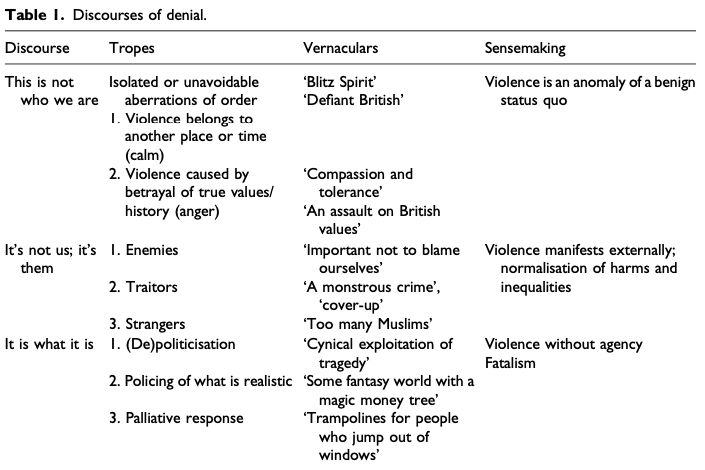@cais-exeter.bsky.social @researchspin.bsky.social
@cais-exeter.bsky.social @researchspin.bsky.social
🔹 The idea that violence in global cities like London is an aberration furthers myths about how violence is meant to happen to some people and places but not others.
🔹 Denial undermines social justice; it forecloses the pursuit of structural change.
🔹 The idea that violence in global cities like London is an aberration furthers myths about how violence is meant to happen to some people and places but not others.
🔹 Denial undermines social justice; it forecloses the pursuit of structural change.
🔹 Calls for systemic change were dismissed.
🔹 Responses seen as ‘political’ were rejected.
🔹 Proposed ‘solutions’ were often fatalist—barriers, trampolines, walking sticks—rather than tackling root causes.
🔹 Calls for systemic change were dismissed.
🔹 Responses seen as ‘political’ were rejected.
🔹 Proposed ‘solutions’ were often fatalist—barriers, trampolines, walking sticks—rather than tackling root causes.
🔹 Blame was assigned to ‘others’—enemies, traitors & strangers.
🔹 Grenfell victims often racialised & seen as ‘other’; politicians accused of ‘hiding the facts’.
🔹 Responses to London Bridge invoked a war with Islam, homogenising Britain’s Muslim communities as suspect.
🔹 Blame was assigned to ‘others’—enemies, traitors & strangers.
🔹 Grenfell victims often racialised & seen as ‘other’; politicians accused of ‘hiding the facts’.
🔹 Responses to London Bridge invoked a war with Islam, homogenising Britain’s Muslim communities as suspect.
🔹 Violence was framed as an exception, belonging to another place or time.
🔹 Both events were treated as disconnected from ‘our way of life’—even though global connections made them possible.
🔹 Violence was framed as an exception, belonging to another place or time.
🔹 Both events were treated as disconnected from ‘our way of life’—even though global connections made them possible.


